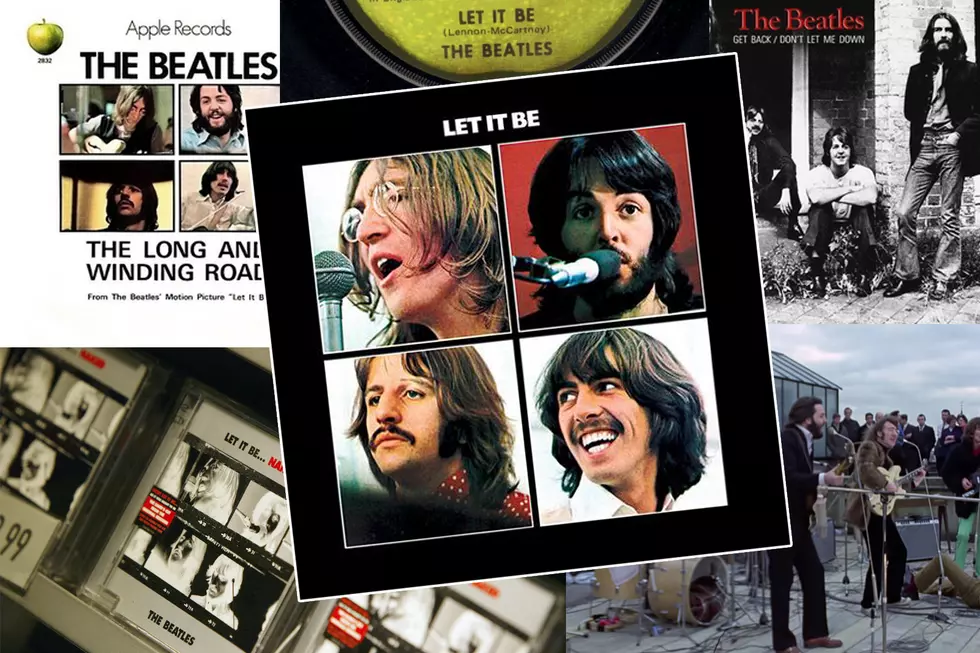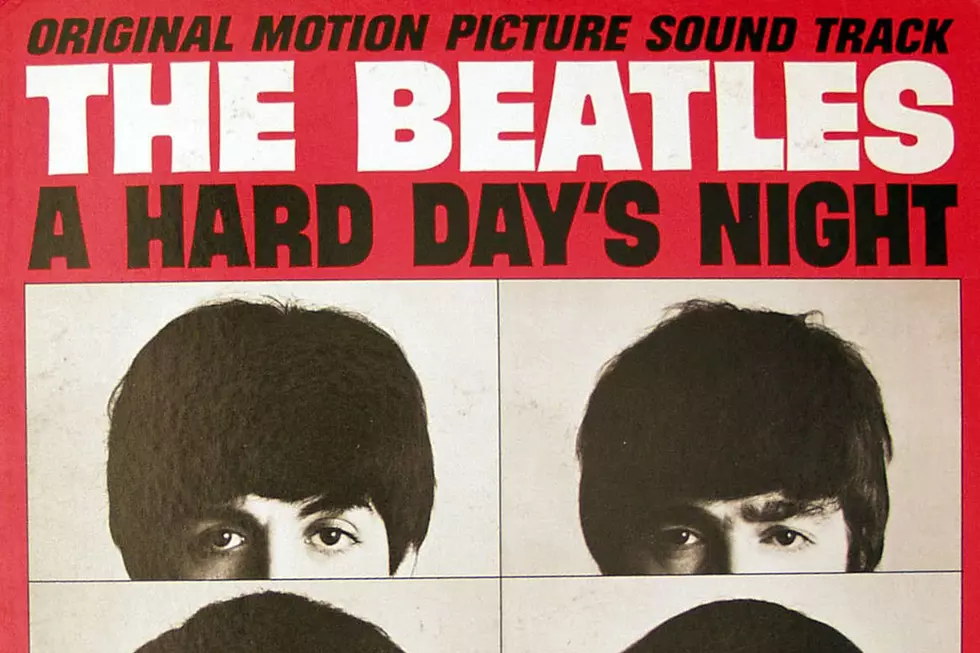
50 Years Ago: Did the Beatles Let Us Down With ‘Let It Be’?
Released on May 8, 1970, nearly a year and a half after it was recorded, Let It Be served as the Beatles' swan song.
The record, and its accompanying documentary, began life as a project spearheaded by Paul McCartney to return to the band's roots as a live rock 'n' roll group, with no overdubs or other studio enhancements. But the Beatles pretty much disintegrated during the sessions - George Harrison even walked out at one point - and Phil Spector was brought in to clean up the mess after the band's usual producer, George Martin, bowed out and engineer Glyn Johns couldn't figure out what to do with the hours of tapes.
Spector added strings and choirs to sweeten the music's sound, and his often heavy-handed approach to the songs is a major reason there's never been a general consensus regarding Let It Be.
For the album's 50th anniversary, UCR discussed the record, how it's rated in the Beatles' catalog, the best and worst songs and Spector's involvement, including his decision to leave off John Lennon's "Don't Let Me Down" from the LP.
Is Let it Be overrated, underrated or properly rated?
Michael Gallucci: I think it's occasionally underrated by some fans - mostly because Phil Spector's post-production work can be tough to get through at times. But the heart of the album is the songs, and many of them are great. And honestly, some of Spector's decisions don't bother me so much, like trimming "Dig It" to less than a minute and adding strings to "The Long and Winding Road," which practically begs for them. Still, did he need so many?
Nick DeRiso: This has always been a touchstone album for me, if only because I believe that great groups are better understood by exploring their stumbles rather than listening once more to obvious successes. The Beatles were being forced to deal with a very grown-up situation for the first time in years: No faking it with psychedelic effects, no more relegating the others to a backing band. They couldn’t get un-tracked at first, and this album was initially shelved. Our listening experience was unfairly, and forever, colored by that. The truth is, however, that Let It Be is actually better than it’s usually given credit for – and could have been better still if Phil Spector hadn’t draped parts of it in a gauzy cloak of strings and chorus-choir schlock.
Dave Lifton: I rate it in the mid-to-lower range, and most of my friends feel the same way, so I'd say it's properly rated. Its high points are amazing, but it's pretty clear that McCartney is the only one whose heart is in the project, which makes sense given that it was his idea. Lennon is inconsistent; Harrison's contributions are nice but slight - "I Me Mine" needed Spector to duplicate 51 seconds to even make it to 2:26. Plus, he was starting to save his best material for All Things Must Pass. Ringo Starr is his usual steady and tasteful, but doesn't do much to stand out - though that could probably be because there was so much mid-tempo material.
Corey Irwin: Underrated, but only slightly. Whenever people talk about the album, they almost always bring up the circumstances surrounding it - infighting within the band, Phil Spector, its status as the final album that wasn’t really “final.” All of those factors get in the way of the song themselves, which were actually really good. “Get Back,” “The Long and Winding Road” and “Across the Universe” would be career highlights for any other band, while the album’s title track is obviously timeless. In our own ranking of Beatles albums, Let It Be came in at No. 9. I’d personally put it at No. 6.
Dan Rivkin, They May Be Parted: As underrated a title you’ll find in the Beatles’ catalog, Let It Be isn’t the grim soundtrack of a band breaking up but a victim of awful timing. An immediate post-breakup release forced to follow up Abbey Road, paired with a glum film and competing with bickering solo artists, Let It Be’s reputation suffers undeservedly. Still, considering it’s a really a compilation album – part-live, part-studio, two cuts far removed from the core January 1969 sessions, plus a couple throwaways – Let It Be perseveres, despite Phil Spector’s handiwork. The spark of the rooftop concert shines through (and avoids Spector’s touch), and sees Paul McCartney deep in his stride – “Let It Be,” “The Long and Winding Road” and “Get Back” would make a career for some, but for McCartney it’s just part of the contribution to one LP. Pair that with a couple of enjoyable George Harrison tracks, Billy Preston’s invaluable involvement and a typically strong effort from Ringo Starr, it more than makes up for John Lennon’s creative lull. Make an EP of the four rooftop and four studio tracks and release it in late-spring 1969, and would we question if the Beatles passed the audition?
Martin Kielty: It’s underrated through context, but there are disappointing elements to it. To me it’s a good Beatles album, but one that I’d say hinted at something that was to come next. Of course, we know what came next – Abbey Road – but if Let It Be had gone out first, where might it have taken the band? My biggest criticism is the amount of voices to be heard that weren’t the Beatles. On countless TV shows and in real-life situations, when you see someone struggling through emotions to explain something that’s being asked at the wrong time, friends will step up and say, “What he means is … ,” and I think that’s what was going on here. Of course, we all know why. More importantly, I’ve always liked the idea of what McCartney was trying to achieve – to “get back” to where the Beatles had been more sure of themselves as a unit. That was never going to work, but it’s brilliant – kinda Odyssean – that it was tried. I’m always on the side of people who try things, regardless of the risks.
What’s the best song on Let It Be?
Gallucci: "Let It Be" is one of Paul McCartney's all-time best, a song he wrote for his late mom but it could just as well be about the end of the Beatles or even a religious hymn. It's a perfect summation of the album, the era and, in a way, the group's final years. Plus, it's just such a well written song.
DeRiso: “Get Back” is probably the truest answer, but it had been out for more than a year by the time this album arrived. So, I’ll dig deeper into a couple of moments when Let It Be rekindles its original concept of playing together again as a band. Both involved a shared microphone between Paul McCartney and John Lennon: the acoustic, album-opening “Two of Us” and the driving, album-best “I’ve Got a Feeling.” The rocker was earthy and emotional, with a dash of note-perfect salacious humor. It showed, once again, that the magic of the Beatles couldn’t be recreated in pieces.
Lifton: On Let It Be, it's a case of "best" versus "favorite" for me. The best song, solely in terms of music and lyrics, is "The Long and Winding Road." But my favorite is "One After 909." It's the only time on the record where McCartney's concept of returning to their roots comes through. They're playing a simple blues - one they wrote years earlier - with the two leaders singing together; Harrison's solo is perfectly constructed and Starr is bashing away. "I've Got a Feeling" comes close sonically, but the song isn't that great, and "Two of Us" lacks contributions from Harrison and Starr.
Irwin: Boring answer, but it has to be “Let It Be.” It’s one of the most recognizable songs in the history of music, and in the discussion for the best Beatles song ever written.
Rivkin: The title track is the crown jewel of Let It Be. Projecting faith and optimism, “Let It Be” is McCartney at his best as a songwriter, scripting a proto-power ballad rooted in gospel, and the group matches his soulful effort with careful, concise instrumentation (thanks to some overdubs) and harmonies.
Kielty: The title track’s timelessness makes it a special piece of work. There’s an old west-of-Scotland phrase: “Whit’s fur ye’ll no’ go by ye” (“What is destined to come to you will not pass you by”), and the song’s moral is sourced from the same Celtic wisdom – acceptance of bad times as the the cost of enjoying good times. McCartney captures the emotion of an Irish-Catholic mom singing to her upset young son, comforting him while refusing to deny that there will be more hardship in the future. Regardless of what was happening to the Beatles, it’s just a beautifully captured vibe, and the corresponding softness in the original production emphasizes it. “Let It Be” is one of the Beatles’ best songs.
What’s the worst song on Let It Be?
Gallucci: Like "Dig It," "Maggie Mae" clocks in at less than a minute. But at least "Dig It" was an original song and trimmed for the album from a longer (and better) take. "Maggie Mae" is a tossed-off traditional Liverpool folk song from the Beatles' youths that certainly captured the freewheeling spirit of the original Get Back sessions. But it has no place on Let It Be.
DeRiso: On one level, I almost get Spector’s impulse to Vegas up McCartney’s "The Long and Winding Road." How else to approach such a wispy weeper? In an odd way, Spector helped complete the White Album’s artistic bridge toward their later individual personas. We get a taste of the soaring triumphs to come on George Harrison’s All Things Must Pass, a whisper of the hard-eyed brilliance found on Lennon’s Plastic Ono Band – and, yes, the sticky sweetness of some of McCartney’s solo stuff.
Lifton: If we're lucky, the full-length 15-minute jam that produced "Dig It" will never officially be released. Of the other low points, "Dig a Pony" is slight, but there's that tricky opening part, and "Maggie Mae" has Lennon singing in a Scouse accent, which is always fun. And the Lime Street reference reminds me of my trip to Liverpool.
Irwin: “Dig It” and “Maggie Mae” both seem to be filler, neither one providing anything artistically interesting or even clocking in at more than a minute in length. I understand why McCartney excluded them from Let It Be … Naked. Of the two, I’d pick “Maggie Mae” as the worst.
Rivkin: In 1980, Lennon claimed McCartney ruined “Across the Universe,” committing “subconscious sabotage” on the original recording. The real dirty work was Spector’s. Using the same tapes the Beatles recorded in February 1968, there’s a tacky charm to the excessive production of Let It Be’s version of “Across the Universe.” But compared to every other iteration of the song released - each of which could have been the LP’s standout track - this track is languid and thick. (I’m disqualifying “Dig It” based on length.)
Kielty: “Maggie Mae” isn’t really a song; it’s more of a comedy turn in a British music-hall variety concert. It’s interesting for it to be there, especially in the circumstances, reminding us of the band’s endless humor, and of course their roots as a music-hall skiffle group. But it really doesn’t need to be there.
Is Let It Be … Naked better or worse than Let It Be?
Gallucci: I still return to Let It Be when I want to hear those songs, but Naked is the more accurate album, as far as the Beatles' original intentions. Hearing them without Phil Spector's occasionally heavy-handed glop makes it even more clear just how great some of those songs are. I view them as two different albums really: what the Beatles wanted and what they ended up with.
DeRiso: They took away Spector’s added-on artifice, fixing both "The Long and Winding Road” and "Across the Universe,” which had also been weirdly slowed down on the original album. They corrected the playing order. They fixed a few of the inevitable played-live flubs that always jumped out – notably when Lennon came in too early on the final riff from “Dig a Pony.” Harrison’s wandering acoustic is more prominent on “For You Blue." They deleted extraneous studio chatter that had been appended to several songs. So, in short, yeah – better.
Lifton: I've listened to Naked once, the day I bought it. I'm one of the comparatively few people who likes Phil Spector's overdubs. Okay, the choirs are overwrought, but the strings add a lot. And considering in Anthology McCartney addressed the idea of making The Beatles a single album by saying, "It's great, it sold, it's the bloody Beatles' White Album. Shut up," he should have known to leave well enough alone.
Irwin: Some songs are improved by Spector’s “Wall of Sound” layering, others are better served by being stripped down to their basic sound. The perfect version of this album still hasn’t been released - it lies somewhere in between the 1970 LP and the Naked effort. Forced to choose one, I’d still go with the original.
Rivkin: Naked's removal of the dialogue that dots the original Let It Be tears away its soul and humor, and effectively neuters a significant part of Lennon’s influence on the original LP. That alone outweighs any perceived benefits from losing Spector’s production. We at least get a clearer picture of Billy Preston’s contributions on Naked – perhaps the record’s most redeeming feature along with the inclusion of “Don’t Let Me Down.” But it’s not an even trade-off, especially with Naked’s numerous harsh fade-outs.
Kielty: To me, it’s better. But I’d add that if it wasn't, it would never have been considered, whereas the original album was there because it had to be whatever it was. Naked feels like the answer to a question - the “What I meant to say was … ” after hearing the response to the original album. Of course you could regard it as an ego trip, but who doesn’t want to hear how a Beatle would have finished a Beatles song? Incidentally, when I talk about Naked being “better” I don’t mean “much, much better” – though parts of it are. I wonder, if the 1970 LP had never been released, and the Beatles had ended their original output with Abbey Road, and then Let It Be had come along in the 21st century as a previously unreleased record, how would it have been received?
Should "Don’t Let Me Down” have been included on the album?
Gallucci: Yes. Like "Two of Us" and "I've Got a Feeling," "Don't Let Me Down" captures the raw and loose atmosphere the sessions were originally supposed to be about. Some of that got lost along the way, and then the Beatles lost interest in the project, which eventually led to Phil Spector assembling the Let It Be album. Some bad decisions were made; leaving off "Don't Let Me Down," one of the best songs from the sessions, was perhaps the worst.
DeRiso: Lennon seemed to recede during these sessions, and that was in part because of choices made in the post-production process. “Dig a Pony” was edited, taking away a searing cry of desire at both the beginning and end: “All I want is you!” “Across the Universe” ended up unfolding at an unfocused crawl. True, there were better songs left unfinished. But why feature two throwaway Lennon-sung snippets (“Dig It” and “Maggie Mae”) rather than “Don’t Let Me Down,” the darkly emotional non-album B-side to “Get Back”? Maybe the most head-scratchingly odd choice of the whole era. It re-balances the whole album.
Lifton: Most definitely. Apart from "Across the Universe," Lennon's contributions, outside of singing in tandem with McCartney, are slight, and "Don't Let Me Down" would have leveled things out a bit.
Irwin: Yes. Sure, it was released prior to the album, but so was “Get Back.” “Don’t Let Me Down” is a fantastic song, and it lifts the entire quality of the LP when added to the track listing. That alone makes it worthy of inclusion.
Rivkin: A non-album B-side is a cruel fate for “Don’t Let Me Down.” And if “Get Back” was good enough to appear on both the LP and a 45, there’s no excuse for “Don’t Let Me Down.” Lennon is raw and sincere, the construction of the song was a true collaborative effort and the performance highlights the entire ensemble. It may be Lennon’s finest song from 1969, and any album would be enhanced from its inclusion, much less a clear fit like Let It Be.
Kielty: If it had been there, it would have offered a rounder illustration of where the Beatles were as they stumbled toward their demise – one of the things that troubled them was their increasing desire for a level of honesty that reflected the experience of the past half-decade, as opposed to the honesty of young men starting out in the world. I agree with McCartney that “Don’t Let Me Down” is one of Lennon’s most honest songs – and, like “Let It Be,” it has a hymn-like quality to it. Comparing the two songs is a fascinating snapshot of Lennon and McCartney, and it’s definitely nice to have them close by each other on the same record.
Beatles Albums Ranked
More From Ultimate Classic Rock









